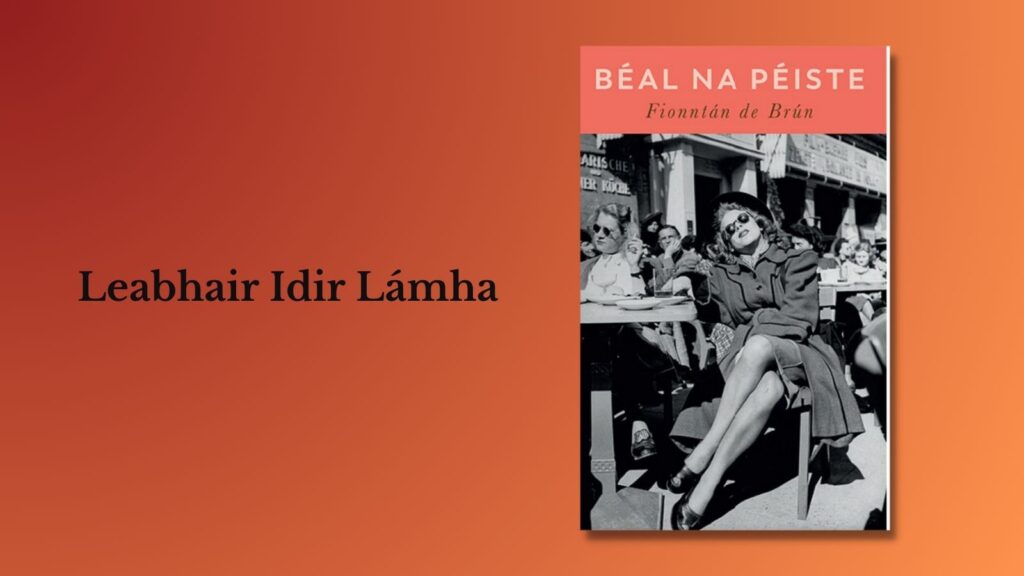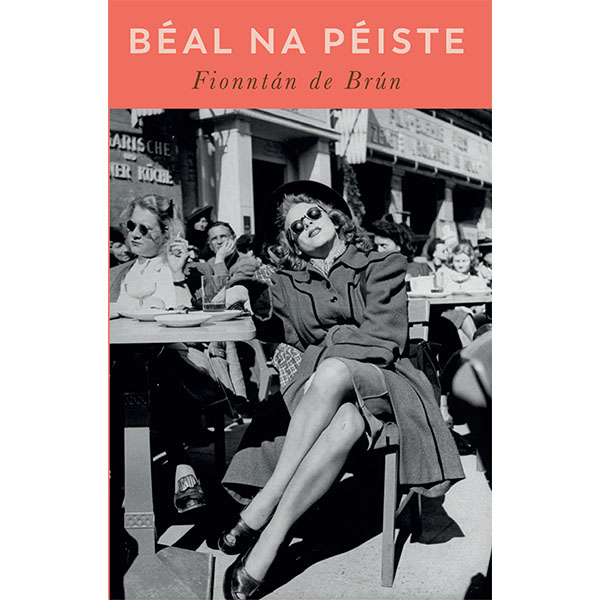
Béal na Péiste|Fionntán de Brún|Cló Iar-Chonnacht|ISBN 976-1-78444-253-8|€15
Questions of conscience, friendship, and personal choice in Fionntán de Brún’s novel Béal na Péiste
by Cathal Póirtéir
Fionntán de Brún‘s novel Béal na Péiste will be among the books of the year in Irish language publishing.
Mostly set during World War II, the novel successfully mixes historical and fictional characters and events with the bulk of the action taking place in Ireland and in Hitler’s Germany—but also features episodes in New York, Buenos Aires, Paris and Brussels.
The main character is Réamonn Prút who returns to his native Belfast in the late 1980s to visit his dead parents’ home in Ardglass, having spent a lifetime abroad as a language teacher. We are introduced to him and his memories of events half a century before when he was an adventure-seeking youth.
Seeking adventure
In his early life, with his best friend Jimí, he decides that only a life of personal and artistic freedom will do. He wants to throw of the shackles of parental supervision and home life and seek adventure where he can find it. Leaving his friend behind, he first joins the merchant navy and later makes the fateful decision to work in a factory in Germany just as World War II is kicking off.
I really enjoyed Béal na Péiste and would recommend it to anyone who enjoys well written and readable popular literature.
Initially, he seems to be unaware of the evils of fascism and to care little about Germany’s invasion of neighbouring countries and is happy to take up an offer to work as a translator for a Nazi radio channel on their Irish language propaganda broadcasts. He is given little to do apart from preparing to broadcast on Beatha Wolfe Tone.
He calls on his local knowledge of Belfast where six men are sentenced to death in Crumlin Road prison but his superiors cherry pick his script and hand it over to fellow Irishman and Nazi propagandist broadcaster, Lord Haw Haw working on English language propaganda in the same radio building.

Secret, decadent world
An Irish woman called Róisín is already hard at work there, full of praise for the new world order she believes the Nazis will bring about and keeps tabs on Réamonn both at work and beyond. She strongly disapproves of his association with two young White Russian girls he takes up with.
Elena and Larissa are out to enjoy life and introduce the young Irishman to a secret, decadent world that manages to continue in the shadows despite being in danger from the authorities. Réamonn falls for Elena, despite his boss warning him to stay away from her.
Réamonn also meets Irish revolutionary republican socialist Frank Ryan who is in Germany against his will, and who does his best to get the younger man to see the evils of Nazism and what is being done to the Jews.
The anti-Fascist Ryan convinces the young Belfast man to get out of Germany as soon as he possibly can. Réamonn wonders if he can get Elena to come with him but before he can make plans her friend contacts him to say she is frightened and that Elena has gone missing.
Réamonn’s superiors choose him to be parachuted into Ireland and drop him within miles of his parents’ home which he visits briefly before escaping over the border where he is soon arrested. His Special Branch inquisitors have read the account of his adventures he has been keeping for his friend Jimí and decide that he’s no threat to the state but send him back over the border.
Elements of a thriller
Much of the story is told in the first person through the diary entries but in other parts we have the perspective of a third person narrator. The story is not told in a totally chronological way, shifting occasionally from the 1940s to the 1980s where the protagonist eventually finds himself drawn into a plot involving his old friend’s daughter and her plans to carry out a terrorist attack on a politician in Brussels. I won’t spoil the ending here. Read the book if you want to find out what happens!
There are elements of a thriller, a love story and an historical novel here that allow the author to ponder questions of conscience, friendship and personal choice.
I really enjoyed Béal na Péiste and would recommend it to anyone who enjoys well written and readable popular literature. There are elements of a thriller, a love story and an historical novel here that allow the author to ponder questions of conscience, friendship and personal choice.
I found my suspension of disbelief strained occasionally by fortuitous coincidence or motivations that felt a bit flimsy—but the pace and nature of the events whisk the reader through the story so well that those quibbles won’t take from the reader’s enjoyment.

Cathal Póirtéir has specialised in researching, presenting and commissioning Irish interest material in various radio formats and in books, including history, literature and folklore in Irish and English, as well as current affairs and drama.











